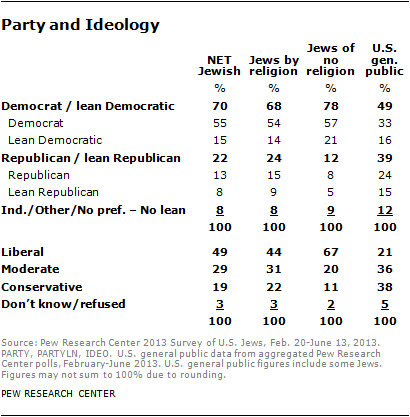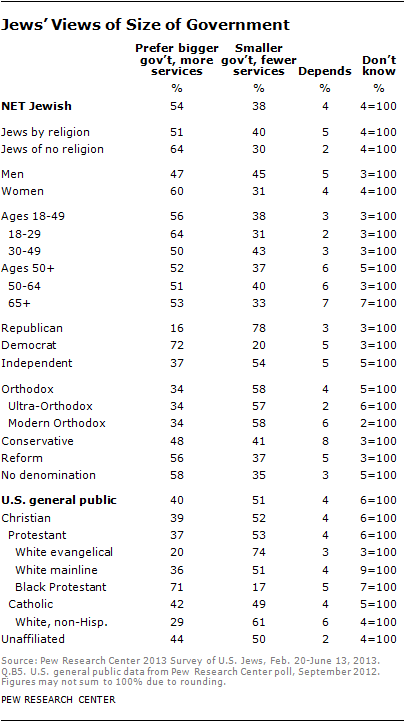Jews are among the most strongly liberal, Democratic groups in U.S. politics. There are more than twice as many self-identified Jewish liberals as conservatives, while among the general public, this balance is nearly reversed. In addition, about seven-in-ten Jews identify with or lean toward the Democratic Party. Jews are more supportive of President Barack Obama than are most other religious groups. And about eight-in-ten Jews say homosexuality should be accepted by society.
Interestingly, one Jewish subgroup does not fit this liberal, Democratic profile: Orthodox Jews. Roughly half of Orthodox Jews describe themselves as political conservatives, and 57% identify with or lean toward the Republican Party. And in their attitudes about homosexuality, Orthodox Jews more closely resemble evangelical Protestants than other Jews, with nearly six-in-ten saying homosexuality should be discouraged by society.
The survey also asked Jews about their perceptions and experiences of discrimination. Roughly one-in-seven say they have been called an offensive name or been snubbed in a social setting during the past year because they are Jewish. About four-in-ten say there is a lot of discrimination against Jews in the U.S. today, but this is much lower than the percentage of Jews who perceive a lot of discrimination in America against some other minorities, such as gays and lesbians, Muslims, blacks and Hispanics.
Partisanship and Ideology

U.S. Jews are a largely Democratic, politically liberal group. Overall, seven-in-ten Jews (including 68% of Jews by religion and 78% of Jews of no religion) identify with or lean toward the Democratic Party, while just 22% identify with or lean toward the Republican Party. And roughly half of U.S. Jews describe themselves as political liberals (49%), including 44% of Jews by religion and two-thirds of Jews of no religion (67%). By comparison, the general public is much more evenly divided between the two parties (49% identify with or lean toward the Democratic Party, while 39% identify with or lean toward the GOP) and is much less politically liberal.
In Pew Research surveys conducted since 2000, the partisanship of Jews by religion has shown some variability, but they have always identified with the Democratic Party over the GOP by large margins. Roughly two-thirds of Jews by religion have identified as Democrats or Democratic-leaners over the past decade, and there has never been a year in which support for the Democratic Party has dipped below 62%.

Jews by religion are more than twice as likely as members of most other religious traditions to describe themselves as politically liberal. And black Protestants are the only religious group with a larger share than Jews by religion that identifies with or leans toward the Democratic Party. For their part, Jews of no religion are even more politically liberal and Democratic-leaning than is the overall religiously unaffiliated population, which itself is among the most strongly liberal and Democratic groups in the population.
But while Jews overall are a strongly liberal, Democratic group, there are pockets of conservatism and Republicanism within the Jewish population. Orthodox Jews identify with or lean toward the Republican Party over the Democratic Party by a 57% to 36% margin. And 54% of Orthodox Jews, including 64% of Ultra-Orthodox Jews, consider themselves politically conservative. On these measures (partisanship and ideology), the only other U.S. religious groups that are as conservative and Republican as Orthodox Jews are white evangelical Protestants and Mormons.

Upwards of eight-in-ten Jews (83%) say that they are absolutely certain they are registered to vote at their current address. This exceeds the share of the general public that says they are registered to vote.
Views of Obama

The strong Democratic leanings of Jews carry over to their views of Obama. Exit polls indicate that two-thirds of Jews by religion (69%) voted for Obama over his Republican challenger, Mitt Romney, in the 2012 presidential election. And at the time of the survey, roughly two-thirds of Jews (65%) say they approve of the way Obama is handling his job as president. By comparison, in recent Pew Research surveys, half of the general population has expressed approval of Obama’s job performance. Only black Protestants (88%) and Hispanic Catholics (76%) approve of Obama’s performance at higher rates than Jews.
For the most part, Obama receives high approval ratings across a variety of Jewish subgroups. For example, both Jewish men and women approve of Obama’s job performance at high rates (64% and 66%, respectively), as do Jews under age 50 (66%) and those 50 and older (64%). However, one group stands out for its disapproval of Obama’s performance: Orthodox Jews, among whom 54% express dissatisfaction with Obama’s handling of his job.

Jews’ above-average support for Obama is also seen in evaluations of his handling of specific issues, though he gets somewhat lower marks for his handling of specific issues than he does for his overall job performance. Six-in-ten Jews say they approve of the way Obama is handling the economy (60% compared with 44% among the population overall). Six-in-ten Jews also approve of Obama’s handling of the nation’s policy toward Israel (compared with 41% among the public as a whole), and 52% of Jews approve of the way Obama is dealing with Iran (compared with 45% of the public overall).
Obama receives higher marks from Jews by religion than from most other religious groups for his handling of the nation’s policy toward Israel. The strongest critics of Obama’s approach toward Israel are white evangelical Protestants, among whom just 26% approve of his performance in this area.
Orthodox Jews are more critical of Obama’s handling of these issues than are other Jews. Roughly one-third of Orthodox Jews approve of the way Obama is handling the nation’s policy toward Israel (36%), 27% approve of the way he is dealing with Iran, and just 22% give Obama positive marks for his handling of the economy.
Issues – Homosexuality and Size of Government

Jews are strong supporters of gay rights. For example, Pew Research surveys conducted in 2012-2013 find that 78% of Jews by religion favor allowing gays and lesbians to marry legally. By comparison, support for same-sex marriage among the general public stands at 50% in recent polling.
More generally, the current survey of U.S. Jews finds that about eight-in-ten (82%) say homosexuality should be accepted by society, while just 13% say it should be discouraged by society. Eight-in-ten Jews by religion and nine-in-ten Jews of no religion say homosexuality should be accepted by society. Compared with Jews, the general public is far less accepting of homosexuality (57%).
Jewish Republicans are less accepting of homosexuality than Jewish Democrats and independents. But Jewish Republicans are more accepting of homosexuality compared with Republicans in the general population (51% vs. 38%).

Orthodox Jews – especially the Ultra-Orthodox – are far less accepting of homosexuality than are other Jews. Seven-in-ten Ultra-Orthodox Jews say homosexuality should be discouraged by society, a level of disapproval similar to that expressed by white evangelical Protestants, among whom 61% say homosexuality should be discouraged by society. Modern Orthodox Jews are more accepting of homosexuality than Ultra-Orthodox Jews, but they still express less acceptance of homosexuality than do Jews overall.
If given just two choices, about half of the American Jewish population (54%) prefers a bigger government that offers more services, while 38% say they would prefer a smaller government providing fewer services. Among the general population, this balance of opinion is reversed, with 51% expressing support for a smaller government with fewer services and 40% desiring a bigger government with more services.
More Jewish women (60%) than men (47%) say they want a bigger government. Orthodox Jews are the only Jewish denominational group that prefers a smaller government (58%) to a larger government (34%).
Satisfaction With Country, Communities

Most Jews are dissatisfied with the way things are going in the country today; 56% say they are dissatisfied, compared with 39% who are satisfied. Among the general public, 64% express dissatisfaction with the way things are going in the country, while 31% say they are satisfied.

American Jews are about as likely as the U.S. population overall to rate their community as an excellent or a good place to live (88% and 84%, respectively), but Jews are considerably more likely to say their community is an excellent place to live (50% vs. 41%).
About nine-in-ten Jewish college graduates rate their community as either an excellent or good place to live (91%), as do 86% of those with some college education and a slightly smaller majority of those with a high school education or less (77%). Community satisfaction does not vary significantly across gender, age or partisanship.

Discrimination Against Jews
More Jews say several non-Jewish groups face a lot of discrimination in American society than say this about Jews; 72% of Jews say gays and lesbians face a lot of discrimination, 72% say this about Muslims, 64% say blacks face a lot of discrimination, and 56% say the same about Hispanics. By contrast, most American Jews (54%) do not think there is a lot of discrimination against Jews in the U.S. today. A substantial minority, however, says Jews do face a lot of discrimination (43%). And Jews are more likely than the population as a whole to say that Jews face a lot of discrimination in the U.S. today (43% vs. 24% among the general public).
Compared with ratings about other groups, fewer Jews say Catholics (11%), evangelicals (16%) and atheists (27%) face a lot of discrimination in American society today.

About one-in-ten American Jews say that in the past year they have been called offensive names (12%) or been snubbed in a social setting or left out of social activities (7%) because they are Jewish. Overall, 15% of Jews say they have experienced one or another of these things in the past year.
Younger Jews are more likely than others to say they have been called offensive names because they are Jewish. Among Jews under age 30, 22% say they have been called offensive names because they are Jewish, as have 16% of Jews in their 30s and 40s. By comparison, 6% of those ages 50-64 and 4% of those 65 or older say this has happened to them in the past year.




